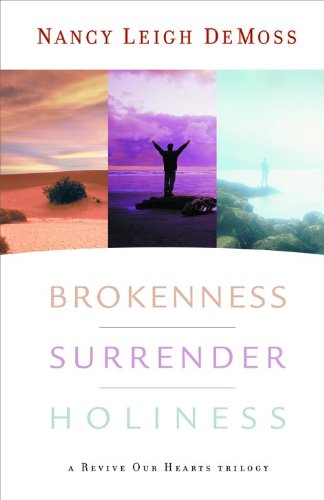Quotes about Self-Esteem
It is both dangerous and wrong to substitute personal preference for biblical principle, to place pleasing self above pleasing God. But it is inevitable that we will make this switch if we are going to make self-esteem and a sense of fulfillment the measure of our lives.
Made For His Pleasure, Moody Press, 1996, p. 65. Get this book!
A preoccupation with psychological theory has in many cases eroded confidence in the Scriptures. When the essence of the human predicament is redefined in terms of lack of self-esteem, it is almost inevitable that people will be directed toward a couch but not a cross, a psychologist but not a Savior.
The wisdom of this world deceptively teaches that believing in the inherent goodness of one’s “self” is foundational to a fulfilled life. However, this erroneous viewpoint overlooks the devastating results of Adam and Eve’s failure to obey God. Scripture teaches that a fulfilled life is not dependent of having a “good self-image” or a “higher self-esteem.” Instead, fulfillment in living depends on your relationship to God and a biblical response to the problem of “self.”
Self-Confrontation Manual, Lesson 4, Page 5, Used by Permission of the Biblical Counseling Foundation.
I suspect that the one reason why the Bible does not foster self-love and self-esteem in the fashion of several strands of popular psychology is because God, unlike popular psychologists, is infinitely aware of the danger of fueling idolatry. The first temptation was the temptation to de-god God and turn self into god. Appeals to self-love and self-esteem, even at their best and even when well-intentioned, can never be far from that danger. Far better to seek the powerful remedies of the gospel.
Love and the Intoxication of the Diligent Routine by D.A. Carson taken from Love in the Hard Places by D.A. Carson, 2002, Crossway Books, a division of Good News Publishers, Wheaton Illinois 60187, www.crosswaybooks.org. Page 189.
We are to love our neighbors as ourselves – and that standard of comparison, as ourselves, is often taken as an implicit command to love ourselves. On this view, the wording not only permits self-love but commands it; it not only sanctions self-esteem but reinforces its importance. On the face of it, however, self-love in Mark 12 is merely presupposed, not advocated. To read much of the contemporary literature, evangelical and otherwise, on self-esteem is to inhabit a domain a long way removed from the second great commandment.
Love and the Intoxication of the Diligent Routine by D.A. Carson taken from Love in the Hard Places by D.A. Carson, 2002, Crossway Books, a division of Good News Publishers, Wheaton Illinois 60187, www.crosswaybooks.org. Page 188.
Obviously self-esteem is not the point. It may be all that can be used for folks in a secular society that will not esteem God, but it is hardly God’s great purpose to make you feel like you’re something special.
Worth a Lot of Sparrows, Christian Communicators Worldwide, www.CCWtoday.org. Used by Permission.
While I disparage the exercise of “building one’s self-esteem” I indulge in it every time I imagine myself free from the defects I perceive in someone else.
By comparing ourselves to other people and trying to make ourselves look better than others, we are boasting. Trying to recommend ourselves, trying to create a self-esteem resume because we are desperate to fill our sense of inadequacy and emptiness. The ego is busy. So busy all the time.
Up until the 20th century, traditional cultures (and this is still true of most cultures in the world) always believed that too high a view of yourself was the root cause of all the evil in the world… Our belief today – and it in deeply rooted in everything – is that people misbehave for lack of self-esteem and because they have too low a view of themselves.
Self-esteemism is based on an unbiblical perspective. It is diametrically opposed to the truth of human depravity. Moreover, while Scripture commends self-control as a fruit of the Spirit, the Bible has nothing positive to say about self-esteem, self-love, or any other variety of self-centeredness.
The self-esteem cult that goes around saying we’ve got to build up people’s self-esteem is taking them the opposite way that the message of the Bible does because the more you love yourself, the less likely you are to need a Savior.
Offending Christ. The article originally appeared (http://www.gty.org/Resources/Sermons/2321) at www.gty.org. © 1969-2008. Grace to You. All rights reserved. Used by permission.
Secularized self-esteem promotes self-deception regarding one’s spiritual needs, which can then lead to eternal self-destruction (Kent and Barbara Hughes).
Disciplines of a Godly Family, Crossway Books, 2004, p. 99. Get this book!
We are so little and vain that the esteem of five or six persons about us is enough to content and amuse us.
There is a lot of confusion today about the self-love referred to in this verse: “Love your neighbor as yourself” (Gal. 5:14). The most common error is to assume that this is a command to loveyourself and that self-love means self-esteem. Both of these assumptions are wrong. Paul and Moses (Lev. 19:18) and Jesus (Lk. 10:27) assume that all people love themselves; they don’t command it: “You shall love your neighbor as you (already) love yourself.” And the self-love they assume is not self-esteem but self-interest: all people want to be happy, even if they often don’t know what will really make them happy.
“Love your neighbor as yourself” is not a command to love yourself. It is a command to take your natural, already existing love of self and make it the measuring rod of your love for others. There is not a harder command in the Bible than this one. It means: Want to feed the hungry as much as you want to feed yourself when you get hungry. It means: Want to find your neighbor a job as much as you are glad you have a job. Want to help your fellow student get A’s as much as you want to get A’s. Want to help the person stalled on the freeway as much as you are glad you are not stalled on the freeway. Want to give the poor softball player a chance to play as much as you want to play the whole game. Want to share Christ with your neighbor as much as you are glad you know Christ yourself.
If you think that the guilt which prepares us to receive the gospel is merely the bad feeling that comes from a low self-image or sagging self-esteem, then the gospel you preach will be just the kind of man-centered, ego-stroking pap that has emasculated the pulpits of our land and obscured the glory of God’s mercy.
We are all starved for the glory of God, not self. No one goes to the Grand Canyon to increase self-esteem. Why do we go? Because there is greater healing for the soul in beholding splendor than there is in beholding self. Indeed, what could be more ludicrous in a vast and glorious universe like this than a human being, on the speck called earth, standing in front of a mirror trying to find significance in his own self-image? It is a great sadness that this is the gospel of the modern world. The Christian Gospel is about “the glory of Christ,” not about me. And when it is—in some measure—about me, it is not about my being made much of by God, but about God mercifully enabling me to enjoy making much of Him forever.
It horribly skews the meaning of the cross when contemporary prophets of self-esteem say that the cross is a witness to my infinite worth… The biblical perspective is that the cross in a witness to the infinite worth of God’s glory, and a witness to the immensity of the sin of my pride.
Do you feel more loved when God makes much of you or do you feel more loved when God at the cost of His Son allows you to make much of Him?
According to the spirit of this age, the ultimate sin is no longer the failure to honor and thank God but the failure to esteem oneself. Self-abasement, not God-abasement, is the evil. And the cry of deliverance is not “O wretched man that I am, who will deliver me?” but “O worthy man that I am, would that I could only see it better!”
Desiring God, Bethlehem Baptist Church, 1996, p. 277, Used by Permission, www.desiringGod.org.
You are not mature if you have a high esteem of yourself. He who boasts in himself is but a babe in Christ, if indeed he be in Christ at all. Young Christians may think much of themselves. Growing Christians think themselves nothing. Mature Christians know that they are less than nothing. The more holy we are, the more we mourn our infirmities, and the humbler is our estimate of ourselves.
The higher a man is in grace. The lower he will be in his own esteem.
Anything which leads to self-esteem leads to the utmost jeopardy. If you have a lowly opinion of yourself, I congratulate you; for this is a main element of safety.
Did you notice that no other books promise to help produce children who esteem others? How can you teach your children to function in God’s Kingdom where it is the servant who leads, if you teach them how to make the people in their world serve them?
Shepherding a Child’s Heart, Shepherd Press, 1995, p. 61. Used by Permission. Get this book!
[Self-esteem] is the most popular way that the fear of other people is expressed. If self-esteem is a recurring theme for you, chances are that your life revolves around what others think. You reverence or fear their opinions. You need them to buttress your sense of well-being and identity. You need them to fill you up.
When People are Big and God is Small, P&R Publishing, 1997, p. 15. Used by Permission. Get this book!
The massive interest in self-esteem and self-worth exists because it is trying to help us with a real problem. The problem is that we really are not okay. There is no reason why we should feel great about ourselves. We truly are deficient. The meager props of the self-esteem teaching will eventually collapse as people realize that their problem is much deeper. The problem is, in part, our nakedness before God.
When People are Big and God is Small, P&R Publishing, 1997, p. 29. Used by Permission. Get this book!
Pastors of many growing churches preach almost weekly about healthy self-esteem, as if it were taught on every page of Scripture. Too many Christians never see that self-love comes out of a culture that prizes the individual over the community and then reads that basic principle into the pages of Scripture. The Bible, however, rightly understood, asks the question, “Why are you so concerned about yourself?” Furthermore, it indicates that our culture’s proposed cure – increased self-love – is actually the disease. If we fail to recognize the reality and depth of our sin problem, God will become less important, and people will become more important.
When People are Big and God is Small, P&R Publishing, 1997, p. 81. Used by Permission. Get this book!
Low self-esteem usually means that I think too highly of myself… When you are in the grips of low self-esteem, it’s painful, and it certainly doesn’t feel like pride. But I believe that this is the dark, quieter side of pride – thwarted pride.
When People are Big and God is Small, P&R Publishing, 1997, p. 32. Used by Permission. Get this book!
Jesus did not die to increase our self-esteem. Rather, Jesus died to bring glory to the Father by redeeming people from the curse of sin. Of course, the cross has many benefits, one being that we are no longer cast out of the presence of God and we have intimacy with the Holy One. But the cross deals with our sin problem, our spiritual need.
When People are Big and God is Small, P&R Publishing, 1997, p. 146-147. Used by Permission. Get this book!













